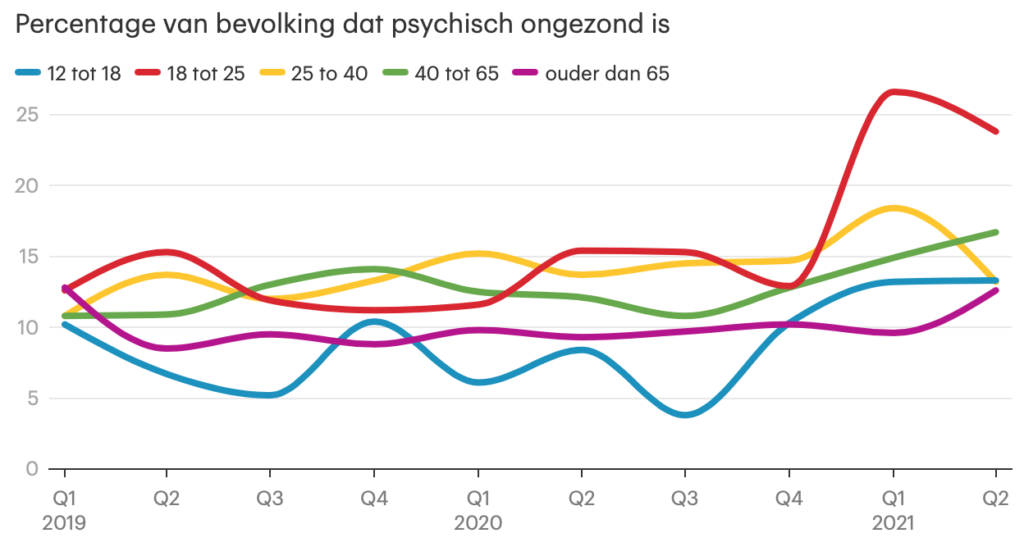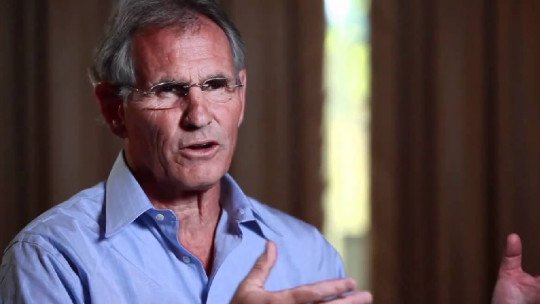Learning to live mindfully is a central theme in the essence coaching en pensions with Tijs Breuer. Last year he helped many people to deal with the unrest, gloom and loneliness. Evidence is growing that mindfulness helps to prevent such depressive feelings and to counteract relapse after treatment of depression. Recent research by Marleen ter Avest shows that especially young people benefit from this.

Right now, almost half of young people between the ages of 16 and 24 are struggling with increasing psychological problems, such as tension and feelings of depression. According to the CBS More than a quarter of people suffer from loneliness, fear, gloom and stress more often during the corona crisis. The mental health of young adults (18 to 25 years) is lowest (see graph).

That's how I read NRC: Our daughter (20) stopped her studies last year, partly due to the restrictive corona measures and came to live at home again. She has taken a major mental blow…. The unpredictability and uncertainty paralyze her. Susan Bögels (professor, UvA) advises in this article: Teach her to accept what cannot (now) be changed, and get started with the options that are still there. There will always be ups and downs in life, let's also see the corona measures in that regard. In short, teach her the basics of mindfulness.
In 1979, the American molecular biologist Jon Kabat-Zinn laid the foundation for mindfulness with Mindfulness-Based Stress Reduction (MBSR), intended for people with chronic pain and stress. He taught them to live in the here-and-now, and in accepting the situation as it is. Watch an interview with him here.
Is there scientific evidence for the effectiveness of Mindfulness?
Melanie Schellekens, PhD candidate at the Radboud Center for Mindfulness, put all scientific facts at a glance on the application of Mindfulness. She was annoyed by a popular science article, which stated that there does not seem to be a problem today that cannot be brushed away by sitting on a cushion regularly.
“With mindfulness you cannot 'meditate away' something, according to Schellekens. “If only it were that simple! When you practice mindfulness, you are present with the experiences in the moment with friendly open attention. Whatever that experience is. In this way you can gain more insight into your thoughts, feelings and automatic reactions. If you can learn to recognize that suffering is part of life and that you can feel what you feel, it can ease the pain.”
Of course there are many roads to Rome. “It is good that there are different treatments and they complement each other, says Professor of Psychiatry Anne Speckens. “One wants pills, the other prefers to talk. Mindfulness focuses more on experience.”
Some facts at a glance
- Mindfulness is effective for anxiety, depression and pain. From a big meta-analysis of 47 studies show that mindfulness is a treatment with a moderate effect.
- You can learn to meditate. A comparison of 20 studies shows that the effectiveness is mainly due to the teaching of mindfulness skills (in addition to cognitive and emotional reactivity, rumination and worrying).
- Mindfulness changes your brain. More gray matter or more alpha waves in parts of the brain means it function better of that part of your brain. Out 21 neuroimaging studies It turns out that eight areas of the brain are consistently altered in meditators, such as your meta-consciousness, your external and internal body awareness, and your self and emotion regulation.
- In a recent article in JAMA Psychiatry, it is shown that mindfulness training is a fully-fledged alternative to long-term use of antidepressants, to prevent recurrent depression. Even if people consider tapering the medication.
Who benefits most from mindfulness?
Psychologist and mindfulness researcher Marleen ter Avest obtained her doctorate at Radboud University Nijmegen at the end of September 2021 on the application of two mindfulness-based therapies in people with recurrent depression.
Ter Avest established that especially people who experience their first depression at a relatively young age – around 30 – and who experience an above-average amount of rumination, can benefit from mindfulness as relapse prevention. Rumination literally means to chew the cud: to keep repeating unwanted thoughts. “Rumination is often accompanied by thoughts such as: if only I had done this or said that. That is not constructive at all.”
During the recent article in NRC she says: “Mindfulness is about awareness of feelings, thoughts, and the body, and the interaction between the three. You increase awareness without having to act on it immediately. If you have bad thoughts, for example, it makes perfect sense to want to do something about it. But sometimes that just adds to the unrest. With mindfulness you notice them, and you can also let them go. You shift the focus from doing to being.”
“The power of mindfulness in depression lies in the fact that people learn to focus on their breathing and their bodies, says Willem Kuyken, professor of psychology at the University of Oxford and director of the Oxford Mindfulness Centre. “It helps to look at feelings from a distance, and to see that thoughts are not fixed facts. Mindfulness will not have a positive effect on every mental illness. There is strong evidence for depression and chronic pain. But there is promising research for burnout, and that's all.”
Also, learning mindfulness in a group does not work for everyone. Maya Schroevers, health psychologist at the University Medical Center Groningen often advises individual counseling. “Especially in people who have a physical chronic illness, they sometimes lack the energy to hear the stories of others between exercises.”




Thank you Tijs, I am convinced that your treatment with love and correct action on your body can feel the space in your mind and physical feeling through the sun, which is necessary to continue through life with a smile……. Thanks Cees